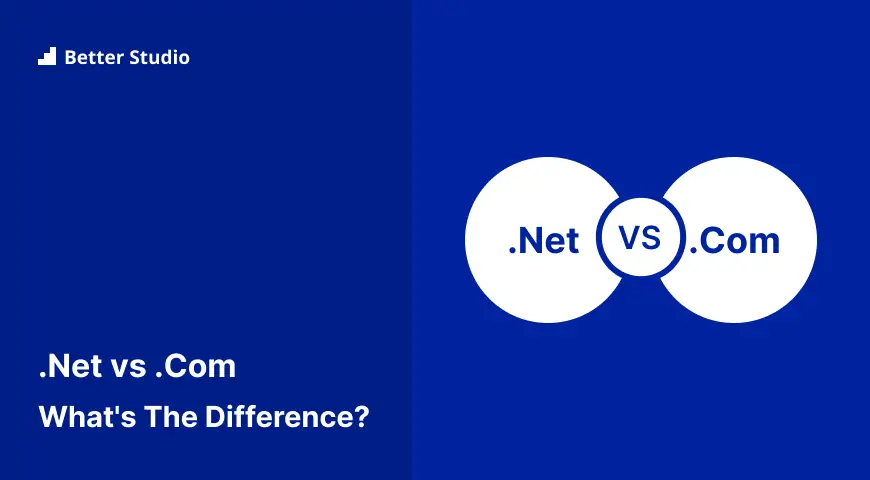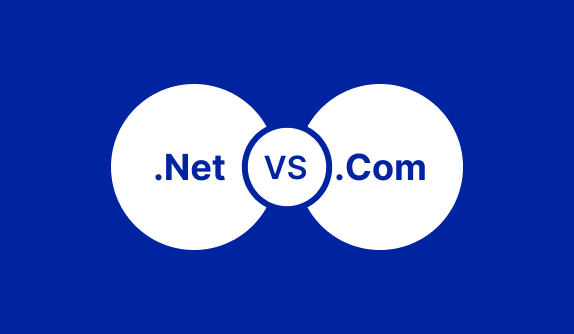Would you like to know the differences between .net and .com? Your domain name is a part of your website’s URL that people type into their browser bar to access it. It can request from the resources stored in your website’s host.
An Internet domain name consists primarily of the name of the website and an extension.
There are thousands of extensions, but the most common ones are .com and .net. Although both can be used for businesses, each has a distinct purpose that sets them apart from the others.
The top-level domains .com and .net have fundamental differences. .com is commonly used for commercial purposes, while .net should primarily be used by web hosting companies.
This article will explain a domain name extension, the differences Between .com and .net, when to use a .com domain extension, when to use a .net domain extension, and the impact of these extensions on SEO.
What Is a Domain Name Extension?
It would be challenging for visitors to remember IP addresses if they didn’t know the domain names. IP addresses would also be more difficult to type and memorize.
It’s better to use a domain name that matches your business’s name, since it can cause visitors to find your site much easier, leading to an increase in traffic and brand awareness.
Domain name extensions are also known as top-level domains (TLDs). Typically, a TLD is the part of a domain name that follows the last dot of the name.
Visitors are more likely to be informed about the purpose of a website by its domain name extension. As you may have guessed, there is quite a variety of extensions in use, including .com, .net, and .org.
There are several types of domain extensions, each serving a different purpose. Common top-level domains, including .com and .net, are described as generic top-level domains (gTLD).
Even though they have become trivial nowadays, .com stands for “commercial” and .net stands for “network”.
Non-profit organizations and businesses often use the extension .org, which was derived from “organization”, to demonstrate that they are non-commercial organizations. However, regardless of the type of website they have, everyone can use these domains.
Several other top-level domains (gTLDs), such as sponsored top-level domains (sTLDs), are exclusively used for specific purposes. Examples include .mil for military entities and .edu for educational institutions.
There is also a class of domains called country-code top-level domains (ccTLDs) that are separate from gTLDs. The country code TLD (ccTLD) signifies the country of origin of a company or website, such as .uk for the United Kingdom or .in for India.
If you reside or do business in a particular country, then you are not required to use a country code top-level domain (ccTLD). However, it’s more likely for customers to find a local business when the domain name includes a ccTLD.
.com vs .net – Differences Between Domain Extensions
Many people assume that .com and .net are interchangeable top-level domains because they are generic top-level domains.
Choosing between a .com domain extension and a .net domain extension requires a thorough understanding of the differences.
The following are the major differences between the domain extensions:
- The .com domain extension is widely used to represent products and services, while the .net domain extension is derived from the word network, indicating that this domain name extension was designed for organizations specializing in network technologies.
- A “.com” domain name represents a “commercial” domain name, whereas a “.net” domain name extension denotes a “network” domain name.
- Business web platforms, e-commerce stores, personal websites, blogs, and various other general categories are included in .com, whereas .net is a suitable extension for web hosts and other internet service providers.
- According to RFC 1591, the .com domain extension is intended to be used by commercial entities, namely companies, whereas the .net domain extension is intended to be used by only network service providers.
- In the case of commercial domain names, the .com extension is most appropriate while for technology-related websites, the .net extension is best.
- There is a cost of approximately $8 to $16 per year for the .com extension, and a cost of approximately $10 to $15 per year for the .net extension.
- A .com domain name gives you credibility for your business website, while a .net domain name makes it easier to obtain a domain name for your website.
- The cost of purchasing a .com domain and the process of finding the most appropriate one to match your business are quite expensive, while the cost of marketing a .net website will be higher in comparison to a .com site with similar functionality.
When to Use a .Com Domain Extension?
The following is a list of applications for the .com domain name extension:
- Professional entities should use the .com extension to demonstrate their credibility.
- Compared to other popular domain extensions, this extension is easier to remember.
- It is a highly recognizable extension and is regarded as a reliable sign of reliability and professionalism.
When to Use a .Net Domain Extension?
The following applications are available for use with the .net domain name extension:
- It is appropriate to use the .net domain name if you offer network-related services, internet databases, email hosting, etc.
- It is common for businesses to register a .net domain extension for their brand to prevent their competitors from using it in their name.
- Speed-checking websites can be accomplished using this extension. In this way, users can monitor their internet speed in real time.
- The majority of business owners wish to purchase both a .com and a .net domain extension to ensure that nobody else can harm their reputation through their domain name.
Do You Need Both .Com and .Net Extensions?
If you wish to ensure the security of your website, consider purchasing the .com and .net domain names. Consequently, you will reduce your risk of competitors acquiring a domain name that is very similar to your own and even capitalizing on it.
Your customers may believe they are at the correct site if they visit yourbusiness.com rather than yourbusiness.net.
Generally, this type of attack targets larger websites. The malicious third party might even insist on receiving a large sum of money in exchange for providing you with the imitated site.
You will be able to increase traffic to your website by having multiple extensions, in addition to security. It doesn’t matter if a customer enters the site from a .net domain name rather than a .com domain name, they will be directed to the same page.
To determine whether you should purchase both a .com and a .net domain, you can use a domain checker and purchase both if possible.
Also, you need to be aware that your contact information can be accessed via WHOIS lookup services. If you wish to protect your personal information, consider implementing a domain privacy protection system.
The Impact of Domain Extensions on SEO
As far as SEO is concerned, the .com extension does not offer any inherent advantages over the .net extension. It does not matter which search engine you use, they all follow the same guidelines.
Nevertheless, the .com TLD is associated with trust, which may explain why websites with this suffix receive more traffic.
In general, people know that all major brands use it, whereas spam sites generally do not, so a .com site may receive more traffic from Google search results than a page with a different TLD.
Only when you apply the extension to your national SEO efforts does it impact your site’s ranking. If you choose the official country code top-level domain (ccTLD) for a country, your rankings may improve in local searches.
For example, if your company is located in the United Kingdom and you use the .uk extension for your website, it will rank well in the UK and receive more clicks.
Conclusion
This article has explained a domain name extension, the differences Between .com and .net, when to use a .com domain extension, when to use a .net domain extension, and the impact of these extensions on SEO.
Greetings, and thank you for reading this article. If you have any questions or comments, please share them in the comments section.
Our Facebook and Twitter pages are regularly updated, so please follow them to stay up-to-date on the latest news.




